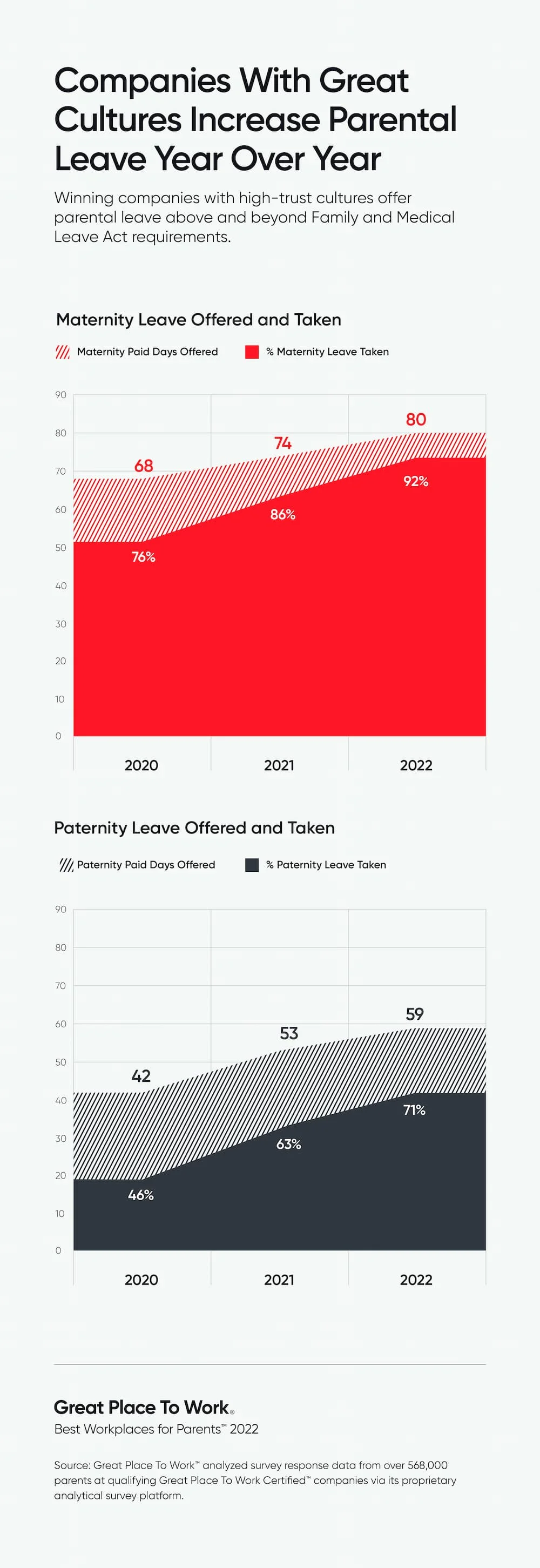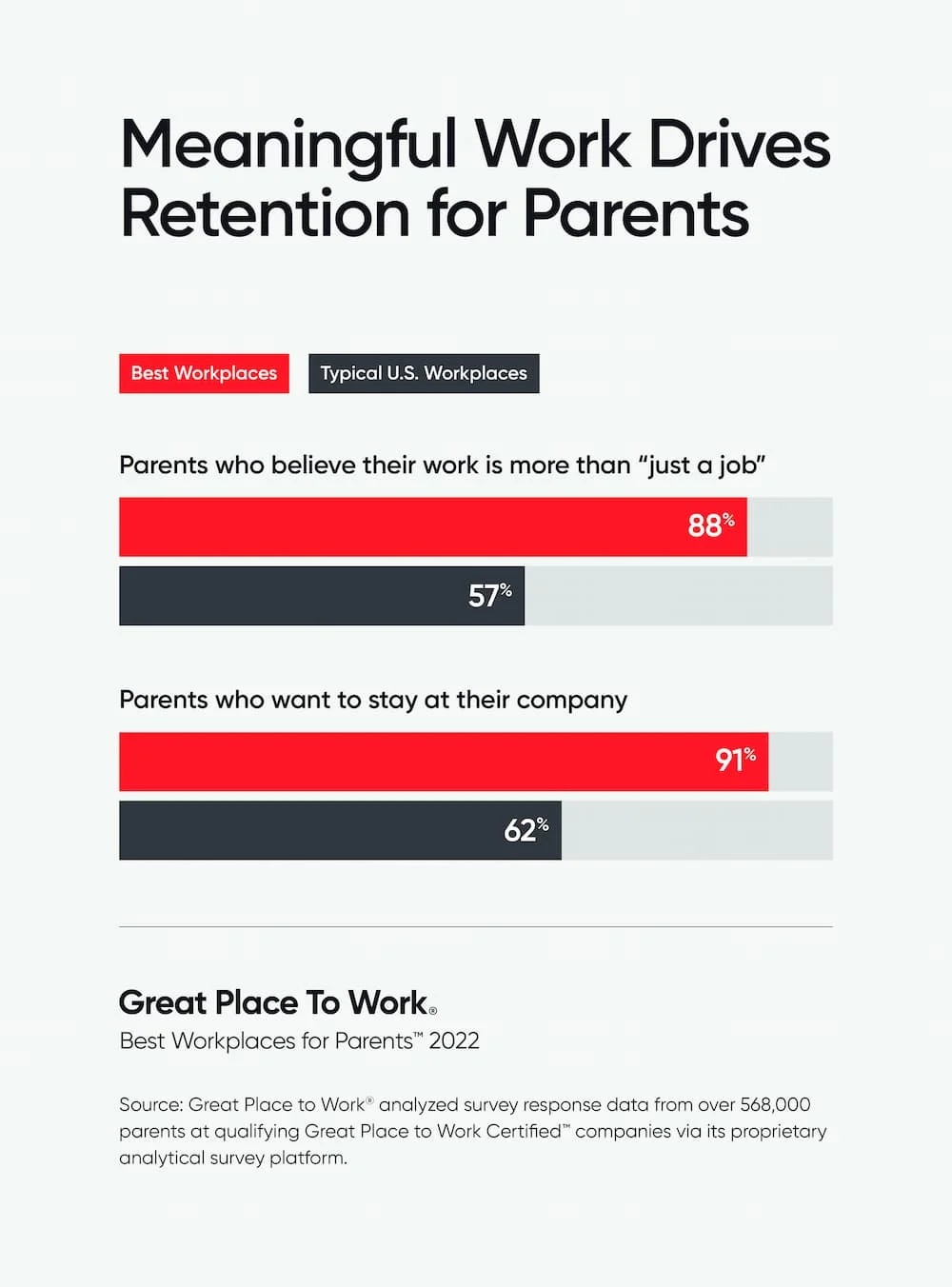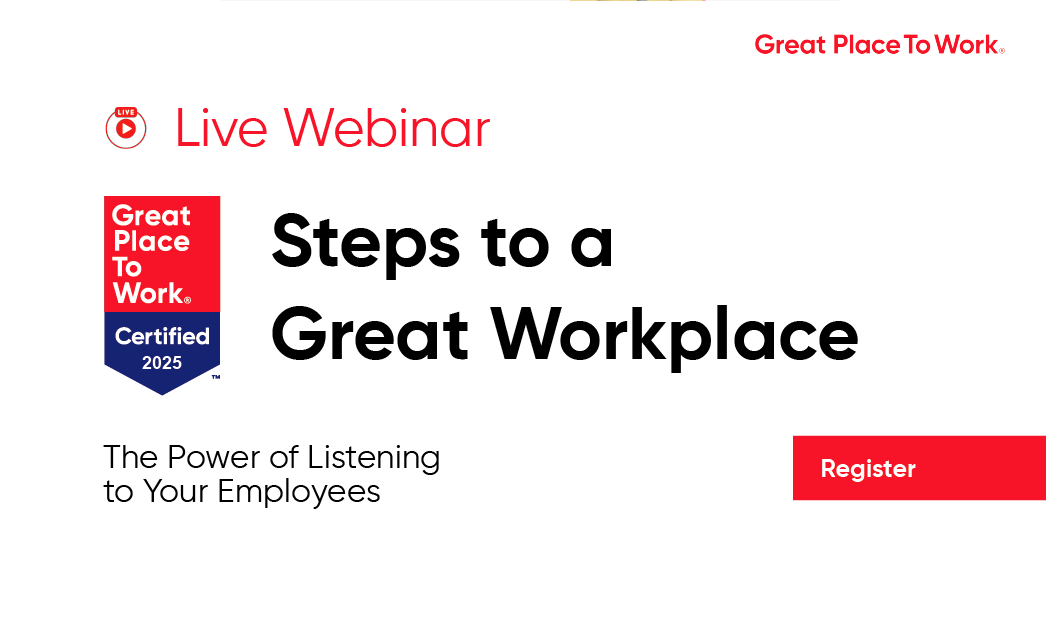Parental leave, work-life balance, and meaningful work engage working parents and drive high retention rates.
There’s a lot of joy when you become a parent, but the stress of taking time off weighs on many new moms and dads.
Many don’t have access to paid leave.
Some U.S. employees are eligible to receive up to 12 weeks of unpaid leave through the Family and Medical Leave Act (FMLA), but the U.S. is the only wealthy country in the world that doesn’t mandate paid parental leave, according to the Organization for Economic Cooperation and Development (OECD). (In comparison, Estonians get 80 weeks.)
The ability to take time off without having to rush back for a paycheck is eased for parents at the 2022 Best Workplaces for Parents™ where paid paternal leave is 16 weeks on average for new moms, and nearly 12 weeks for new dads. Great Place To Work determined this year’s list by analyzing data from more than half a million employees with parenting responsibilities.
Paid leave not only helps working parents enjoy time off with their newborns, but drives retention.
Nearly nine out of 10 parents at the Best Workplaces for Parents say their company has “special and unique benefits,” and when that’s true, they’re 65% more likely to stay with their employer.
A staggering 91% of parents at these companies want to work at their companies for a long time. That’s a far cry from the 55% of parents at a typical U.S. workplace who are open to changing jobs by the end of this year, according to a July Great Place To Work survey of nearly 4,200 workers.
But offering paid paternity leave alone isn’t a silver bullet for retention.
“What sets these companies apart is they have cultures that allow new parents to take paid leave without fear—fear of losing their job, fear of missing out on a promotion, fear of getting left behind,” says Michael C. Bush, CEO of Great Place To Work. “Offering time off in cultures where it can’t really get taken erodes trust.”
These cultures also provide employee well-being support. More than 90% of parents at Best Workplaces say they’re encouraged to balance their work and personal lives.
“Offering paid time off for parents is a good start, but what’s their day-to-day experience like when they’re back at work? Can they make it to their kid’s soccer practice and still get promoted down the line? The answer should be ‘yes,’” Bush says.
Couple time off and employee wellness support with meaningful work, and you’ve created a workplace that will attract and retain parents.
Here’s what the research tells us:
1. Expand special and unique benefits, such as paid leave.
Nearly nine out of 10 parents at the Best Workplaces for Parents say their company has “special and unique benefits,” and when that’s true, they’re 65% more likely to stay with their employer.
Since 2020, these workplaces have steadily increased paid parental leave (by 12 days for moms and 17 days for dads over the three-year span) while other companies have cut leave time.
Great workplaces offer cultures where new parents can take that time. More than 90% of moms and 70% of dads take the paternity leave their companies offer.
“I made the move to Toast last month from a different company and was pleasantly shocked at the benefits package. I re-read it a few times to make sure I was actually reading and seeing it correctly,” said an employee at Toast, ranked No. 21 among large companies. “A lot of companies say today that they support parents but their PTO policies and benefit packages don't actually align with that statement.”
In addition to extending paid leave beyond FMLA requirements, great workplaces for parents offer financial assistance around fertility needs and support nontraditional families.
“When PMG leadership found out I was becoming a foster parent, they enacted foster care parental leave immediately and still are the only company I have heard of to have such a benefit. Just one example, but [the] underlying understanding that PMG as a business has — that in order for us to be successful, the people have to be seen and supported — is one that permeates our culture,” said an employee at PMG, ranked No. 24 among small and medium-sized companies.
“Offering paid time off for parents is a good start, but what’s their day-to-day experience like when they’re back at work? Can they make it to their kid’s soccer practice and still get promoted down the line? The answer should be ‘yes.’” - Michael C. Bush, CEO, Great Place To Work

2. Offer work-life balance support.
One in four working parents suffer from burn out, according to a joint Maven/Great Place To Work study. This burn-out contributed to millions of parents to leave the workforce during the height of the pandemic. Many had to choose between their jobs and taking care of their children.
High burnout levels show no sign of slowing down, making work-life support a key retention driver for parents. Great workplaces understand that parents might want to walk out the door if they have to skip yet another daytime school play, sports game for a work meeting.
Parents are nearly 40% more likely to feel their company is a great place to work if they believe people are encouraged to have a healthy work-life balance. And 91% of parents at these winning workplaces believe their companies support that balance compared with 62% at a typical workplace.
“My boss always allows me to be at events for my children,” said an employee at Baird, ranked No. 45 among large companies. “They always support my family and never make me feel guilty or bad for needing to take off for events with my children. I'm never afraid to ask my boss.”
But it’s not just parents who feel supported at these companies. If you create a culture where you’re communicating respect for people’s lives outside work, it’s good for everyone, regardless if an employee is a parent.
At these workplaces, when nonparents feel they’re encouraged to balance their work and personal lives, they’re 48% more likely to say their employer is a great place to work and they’re 39% more likely to stay with their companies for a long time.
3. Connect meaning to work.
All employers should prioritize connecting what their employees do with the organization’s greater purpose.
It’s not only that the top retention driver for parents is purpose at work, it is also a key predictor of employee attrition for all workers. (Download our Power of Purpose at Work report today.)
Parents at a typical workplace experience less meaning at their jobs — 57% — compared with 88% at the Best Workplaces for Parents, which has a large impact on retention.
There is a three-fold increase in the odds that a parent will stay with their company if they believe their work has special meaning and is more than “just a job.”
Show working parents that they — and all employees — matter. It's what we want in our lives, both inside and outside of work.

Interested in making a Best Workplace list?
Find out how and apply to this or other Best Workplaces lists.
CREDIT: Roula Amire


